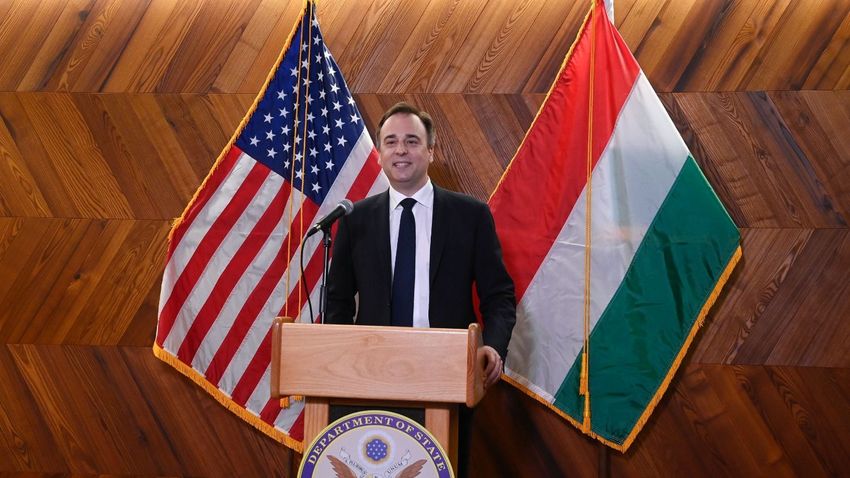The author's article was published on the sándar.hu portal.
As a high school student, I heard the story of a European ambassador who represented his country somewhere far away, in a country that was exotic to him. The desire arose in him to learn a little about the affairs of the natives, and he visited them with the help of an interpreter. They talked for a long time, the interpreter conscientiously translated, but the words, phrases, and references did not add up in the ambassador's mind. He decided to learn the language of the locals, and the next time he communicated with them without an intermediary. However, it didn't get any better. He understood the sentences, but because of the many symbols and transferred meanings, he was still not successful. So he dedicated another few years to getting to know their culture, religion, history, customs, and myths, and finally, after a long, long time, he was almost able to have a meaningful conversation with them.
It's ridiculously sad when people who are inexperienced in our affairs want to educate us. Atheists give us guidelines on faith and Christian duty, a diplomat from a young state from another continent explains our history to us. The cocksurely self-confident Pressmann, who communicates with the natives only through an interpreter, ridicules himself first by remembering 56 and then 45, not knowing that the Russkies whom we sent home during the revolution were the same ones who, according to Pressmann, liberated us. He doesn't understand our thinking, our motivations. (In this, they are kindred spirits with the Hungarian left. A good example of this was the case of István Hiller, who spoke in Latin in the parliament, suggesting that after the return of the county - and other historical names - Latin would follow. However, this would never occur to a national party , because the county is a part of our history, sovereignty, and identity, which was forcibly taken from us by foreign invaders, while we ourselves replaced the official Latin language - which symbolized globalism - with Hungarian in 1844.)
Although we do not expect Pressmann to provide complete information, it is not worthwhile for him to delve too deeply into our traditions for that little time, but he could perhaps read through a short, hastily compiled list. That's why I compiled a superficial information for American ambassadors accredited to Hungary about our relationship with our history.
Soviet occupation in 1945: bad.
German occupation in 1944: bad.
Two Vienna decisions: good.
National occupation: good.
Adventures (the wording is wrong, more correctly campaigns and the era could also be called the age of princedom): rather good.
Tartar district: bad.
Turkish subjugation: bad.
Principality of Transylvania: good.
We love Attila and the Huns, Álmos and Árpád.
We don't like Árpád Göncz.
Napoleon is indifferent.
Habsburgs (quite controversial, despite the recognition of certain virtues, we fundamentally do not like them).
Haynau - very bad.
János Kádár - the same in the domestic edition.
Mátyás – Hunyadi is very good, Rákosi is very bad.
Miklós Horthy - despite some controversial decisions, he is rather good.
József Ferenc - controversial, overall rather harmful.
Ferenc Ferdinand - it was a shame to go to war because of him, consequently World War I was very bad, World War II
World War II is very bad. Trianon - unfathomably unfair, therefore very bad.
Christianity - fundamental.
That's why Szent István is good, but Koppány is also ours. (Come on Szörényi!) 1848-49: good, that is, the Russian (tsarist) intervention at that time was not good, ergo Russians go home.
1956: good, Russian (Soviet) intervention is bad, ergo Russians go home.
During the siege of Budapest in 1944-45, the defense was a borderline case, good in principle, not good because of the great destruction, useful given the consequences, but harmful because of the lack of chance.
Russians go home, Yankees go home, Liberator bombers go home, Messerschmitts go home. Shooting Jews into the Danube is wrong.
It is very wrong to stigmatize, persecute, and confine people to camps because of their origin, political and religious views, and ethnic background.
Killing people (in the womb, on the front line, next door, in the bedroom, in a disco, in camps, on the gallows) is also not acceptable.
(The death penalty applied to common-law criminals is a borderline case, not a historical issue, it is irrelevant to an American ambassador anyway, because it is allowed in some states, but not in others.) Siege of Naples (Louis the Great) - sounds good, but is really unnecessary.
To kill Italians at Isonzo is senseless folly, and although we condone them because of Caraffa, Basta, Belgioioso, Castaldo, our enemy, Capistrano, Garibaldi, and Marco Rossi.
Nándorfehérvár - good.
Mohács - not good.
Defense of Eger, fight with the Turks - good;
Dobó, Bornemissza, Gárdonyi are good, Lieutenant Hegedüs is not good. Expulsion of Turks - good.
Freedom war in Rákóczi - good, but peace in Szatmár is also good.
Dózsa - quite controversial, used to seem good, now maybe bad, so mostly Fradi.
Laying down Görgei's arms - a borderline case, rather a good one (lives spared, further fighting hopeless).
Basically, war is not good, "but in the hands of one who is oppressed by a weapon, / the weapon is glorified and begins to shine", writes Jenő Dsida in his brilliant and undeservedly little-known poem, Psalmus Hungaricus.
The list can of course be expanded (we can work from a really rich material), and if the US Embassy would like a more detailed description, I will be happy to provide them.
Source: vasarnap.hu/Zsolt Ungváry
(Cover photo: MTI/Szilárd Koszticsák )













